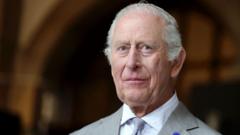King Charles III arrived in Canada on Monday, in a visit steeped in history and tradition, marking his first trip to the country following his coronation. The highlight of this journey will be his delivery of the Speech from the Throne on Tuesday, which inaugurates the 45th session of Canada's parliament. As the head of state for Canada, as well as for other Commonwealth realms including the UK, Australia, and New Zealand, the King’s presence carries notable significance.
Traditionally, the Speech from the Throne is delivered by the governor general on behalf of the Prime Minister, outlining the government's agenda for the upcoming parliamentary session. However, this time newly elected Prime Minister Mark Carney invited King Charles himself to deliver the address, an act seen as reinforcing Canada's sovereignty amidst tense relations with the United States. Carney expressed that this gesture underscores the importance of Canada’s independent identity.
The last time a monarch delivered the throne speech was in 1977 when Queen Elizabeth II performed the task. While King Charles’s grandfather, George VI, visited Canada in 1939, he did not deliver a throne speech. King Charles's participation symbolizes a historical moment, as this marks the first time a king has opened parliament in this way.
The visit commenced at Ottawa's Macdonald-Cartier International Airport, where the royal couple was welcomed by prominent figures including Governor General Mary Simon and Prime Minister Carney. Their itinerary included meeting locals, participating in a tree-planting ceremony, and private discussions with key officials. On Tuesday, the King and Queen will head to the Senate, where the King will receive military honors before delivering his address.
Throughout his reign, King Charles has shown a commitment to Canada, reflecting his support through various symbolic gestures and expressions of goodwill. Known for praising Canada as "proud, resilient, and compassionate," his visit comes at a critical juncture for Canada's national identity, especially in light of external political pressures. The royal couple will further commemorate Canada's fallen soldiers at the National War Memorial before departing the country.
As King Charles III embarks on this significant visit, it serves not only as a reminder of the historical ties between Canada and the Crown but also as a pivotal moment for the nation’s contemporary governance and identity.
Traditionally, the Speech from the Throne is delivered by the governor general on behalf of the Prime Minister, outlining the government's agenda for the upcoming parliamentary session. However, this time newly elected Prime Minister Mark Carney invited King Charles himself to deliver the address, an act seen as reinforcing Canada's sovereignty amidst tense relations with the United States. Carney expressed that this gesture underscores the importance of Canada’s independent identity.
The last time a monarch delivered the throne speech was in 1977 when Queen Elizabeth II performed the task. While King Charles’s grandfather, George VI, visited Canada in 1939, he did not deliver a throne speech. King Charles's participation symbolizes a historical moment, as this marks the first time a king has opened parliament in this way.
The visit commenced at Ottawa's Macdonald-Cartier International Airport, where the royal couple was welcomed by prominent figures including Governor General Mary Simon and Prime Minister Carney. Their itinerary included meeting locals, participating in a tree-planting ceremony, and private discussions with key officials. On Tuesday, the King and Queen will head to the Senate, where the King will receive military honors before delivering his address.
Throughout his reign, King Charles has shown a commitment to Canada, reflecting his support through various symbolic gestures and expressions of goodwill. Known for praising Canada as "proud, resilient, and compassionate," his visit comes at a critical juncture for Canada's national identity, especially in light of external political pressures. The royal couple will further commemorate Canada's fallen soldiers at the National War Memorial before departing the country.
As King Charles III embarks on this significant visit, it serves not only as a reminder of the historical ties between Canada and the Crown but also as a pivotal moment for the nation’s contemporary governance and identity.




















